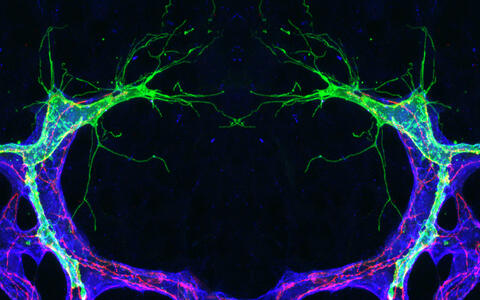A new center for cardiovascular communication research
Joint press release by the Max Delbrück Center and Heidelberg University
Our blood vessels form a highly branched network that in a single person is about 150,000 kilometers long and reaches the most remote parts of the human body. Its finest branches, the capillaries, extend to within 150 micrometers from nearly every cell. Our heart is much more than a pump, and our blood vessels do more than just supply tissues with oxygen and nutrients. They form a dynamic system; the endothelial cells that line vessels are able to pick up, block or amplify many types of signals from within and without. Such signals can promote a long and healthy life or pathological processes. Thus, the heart and vasculature are a communication network that collects and exchanges information throughout the body.
The signals transmitted through this system contribute to health and disease, but decoding them is complex, and very little research has been devoted to understanding these signals. That is about to change with the establishment of a new Helmholtz Institute for Translational AngioCardioScience (HI-TAC) in Mannheim and Heidelberg. The center will be established by the Max Delbrück Center for Molecular Medicine in Berlin and Heidelberg University and will combine expertise at the two sites in cardiovascular research and systems biology.
Microscopic image of sprouting blood vessels in the retina of the eye. Shown in green are individual endothelial cells that are creating new vessels and forging new connections between vessels. All endothelial cell membranes are stained blue, while magenta highlights the inner membrane of these cells
Establishment of HI-TAC will begin in July 2023 after a decision of the Helmholtz Senate on June 20, 2023. Professor Hellmut Augustin has been named as founding director. The project will benefit from partnerships with the European Center for Angioscience (ECAS) at the University Medical Center Mannheim, the Department of Cardiology and Institute of Experimental Cardiology at Heidelberg University Hospital, the Berlin Institute of Health at Charité (BIH), Charité – Universitätsmedizin Berlin, and the German Center for Cardiovascular Research (DZHK). After an initial set-up phase, starting in 2028 the institute expects to have an annual budget of approximately €5.5 million. These funds will be provided by the Helmholtz Association, the Max Delbrück Center, the State of Baden-Württemberg, and Heidelberg University.
New research buildings at Heidelberg University
In addition, the State of Baden-Württemberg will finance a new six-story building for HI-TAC on the campus of the University Medical Center Mannheim. An integrated HI-TAC unit will also be set up in the planned Cardiometabolicum facility on Heidelberg University’s campus in Neuenheimer Feld, close to the German Cancer Research Center (DKFZ) and a new Heart Center to be opened in 2029. Co-working space will facilitate the exchange of scientists and communication between Heidelberg, Mannheim, and Berlin.
A rendering of the planned HI-TAC Building on the campus of the University Medical Center Mannheim.
The goal of HI-TAC will be to investigate mechanisms by which the cardiovascular system mediates interorgan communication addressing influences of metabolism, the nervous system and the immune system. By gaining an understanding of how changes to blood vessels and the heart trigger pathologies, early warning signs can be detected which will permit treatment long before symptoms occur.
Quotes about HI-TAC
“The research conducted at HI-TAC has the potential to uncover knowledge for better health into old age,” says Petra Olschowski, Baden-Württemberg’s Minister of Science, Research and Arts. “The State of Baden-Württemberg, together with the participating institutions in Mannheim and Heidelberg, has granted considerable resources to support local cardiovascular research. Furthermore, HI-TAC and its association with the Max Delbrück Center will strengthen both Berlin and Heidelberg/Mannheim as centers of science. We will establish a working environment that facilitates interdisciplinary research at HI-TAC, made concrete through a new research building in Mannheim and new research spaces in Heidelberg.”
“Systems biology approaches are central to the research program at the Max Delbrück Center. Our goal is to detect pathologies earlier to intervene before organ damage occurs as opposed to treating disease when there is already irreversible damage,” says Professor Maike Sander, Scientific Director of the Max Delbrück Center. “We are developing new concepts and aim to develop clinical applications quickly. To achieve this, we are bringing together basic science, clinical expertise and biotechnology. By amalgamating expertise from the Mannheim-Heidelberg and Berlin regions through HI-TAC, we will create the critical mass necessary to accelerate translation of our findings into clinical applications.”
“Disorders of the inner lining of blood vessels are directly or indirectly responsible for two-thirds of all deaths,” said Professor Hellmut G. Augustin, designated Founding Director of HI-TAC and head of both the Department of Vascular Biology and Tumor Angiogenesis at the Medical Faculty Mannheim of Heidelberg University and the Division of Vascular Oncology and Metastasis at the German Cancer Research Center (DKFZ) in Heidelberg. “Analyzing how cells in the cardiovascular system communicate with other organs holds great potential for identifying novel prognostically and therapeutically relevant molecular targets. The integrative systems medicine approach of HI-TAC will contribute significantly to covering the entire value chain from the discovery of new preventive and therapeutic targets to their validation, all the way to clinical translation.”
“HI-TAC is linked to our two large university hospitals and will forge a close research alliance between Berlin, Heidelberg and Mannheim. Heidelberg University’s research portfolio with its longstanding cardiovascular expertise and the Max Delbrück Center’s focus on basic research into system-wide diseases and technology development complement each other perfectly,” says Professor Bernhard Eitel, Rector of Heidelberg University. “We are convinced that this joint venture will be a success story reaching far beyond the region and with international visibility.”
Professor Otmar Wiestler, President of the Helmholtz Association, says: “With the Institute for Translational AngioCardioScience, the Max Delbrück Center for Molecular Medicine and Heidelberg University are taking a major step forward in a critical area of future medicine. The combined knowledge of both partners in vascular research and systems biology will help to effectively prevent vascular diseases, diagnose them earlier, and stop their progression with tailored therapies.”
About Helmholtz Institutes
Helmholtz Institutes are important satellites of the Helmholtz Association’s research centers. Founded jointly with partner universities, they are focal centers for specific disciplines. The institutes are located on the campus of the respective university and focus on research fields with future innovation potential. They work closely with local and international organizations, thereby creating critical mass for translational research.
Further information
- Helmholtz-Challenges: Understanding the role of damaged blood vessels as a cause of various diseases
- Max Delbrück Center: Discovery for tomorrow’s medicine
- Medical Faculty Mannheim of Heidelberg University
- Institute of Experimental Cardiology, Medical Faculty of Heidelberg at Heidelberg University
-
Contacts
Jutta Kramm
Head of Communications
Max Delbrück Center
+49 (0)30 9406-2140
jutta.kramm@mdc-berlin.de or presse@mdc-berlin.de
Communication and marketing, press office
Heidelberg University
+49 (0)6221 54-2311
presse@rektorat.uni-heidelberg.de
Downloads
-
Microscopic image of sprouting blood vessels in the retina of the eye. Shown in green are individual endothelial cells that are creating new vessels and forging new connections between vessels. All endothelial cell membranes are stained blue, while magenta highlights the inner membrane of these cells.
Photo: Claudio Franco, Max Delbrück Center -
A rendering of the planned HI-TAC Building on the campus of the University Medical Center Mannheim.
Photo: HASCHER JEHLE Architektur / loomn architekturkommunikation
- Max Delbrück Center
-
-
The Max Delbrück Center for Molecular Medicine in the Helmholtz Association (Max Delbrück Center) is one of the world’s leading biomedical research institutions. Max Delbrück, a Berlin native, was a Nobel laureate and one of the founders of molecular biology. At the locations in Berlin-Buch and Mitte, researchers from some 70 countries study human biology – investigating the foundations of life from its most elementary building blocks to systems-wide mechanisms. By understanding what regulates or disrupts the dynamic equilibrium of a cell, an organ, or the entire body, we can prevent diseases, diagnose them earlier, and stop their progression with tailored therapies. Patients should benefit as soon as possible from basic research discoveries. The Max Delbrück Center therefore supports spin-off creation and participates in collaborative networks. It works in close partnership with Charité – Universitätsmedizin Berlin in the jointly run Experimental and Clinical Research Center (ECRC), the Berlin Institute of Health (BIH) at Charité, and the German Center for Cardiovascular Research (DZHK). Founded in 1992, the Max Delbrück Center today employs 1,800 people and is funded 90 percent by the German federal government and 10 percent by the State of Berlin.
- Universität Heidelberg
-
-
Founded in 1386, Ruperto Carola is an internationally oriented research university whose subject spectrum includes the humanities, the social sciences, law, the natural, engineering and life sciences, and medicine. As one of the Universities of Excellence in Germany, Heidelberg University’s successes in the Excellence Competitions and its standing in international rankings confirm its leading role in the academic landscape. It is part of Heidelberg University’s self-concept to further develop outstanding individual disciplines, to strengthen interdisciplinary cooperation, and to carry research results over into society. With a research-oriented course of study in more than 180 programs, its nearly 30,000 students can choose from a virtually singular array of subject combinations and individual qualification pathways.








